INTERNATIONAL LEGAL STATUS OF THE VIENNA INTERNATIONAL CENTRE
According to the published rules regarding ARRL DXCC awards, where the area in question meets at least one of the points in the criteria it may be considered eligible as a separate entity. The present controversy over the country status of the Vienna International Centre (Amateur Radio Contest DX Club station 4U1A) centers on two of the Countries List Criteria. Criterion 1 holds that an area may be considered eligible as a separate entity, i.e., country, by reason of “Government.”
1) Government. An area by reason of Government constitutes a separate entity.
The second pertinent criterion is 5 (b), which states as follows:
(b) Embassies, consulates and extra-territorial monuments will not be eligible for consideration as a separate entity from the host country.
If the Vienna International Centre (hereinafter referred to as VIC) is considered under Criterion 1 to be a separate “government,” it could be eligible for separate DXCC country status. On the other hand, if VIC is an embassy, consulate or extra-territorial monument, it would be ineligible for separate status under criterion 5 (b).
The goal of this paper is to provide information and an opinion on the international legal status of the Vienna International Centre.
Specifically, this paper will analyze the facts and legal doctrine that distinguish VIC as an international legal entity separate from the State of Austria.
INTERNATIONAL LEGAL ENTITY
The State of Austria is, of course, a State in the international legal sense. It is a politically organized body of people that occupies a definite territory and exercises sovereignty over the territory. In the common vernacular such is called a country. In international political circles, however, the term “State” means the independent political and territorial legal entities that make up the international body politic. Examples are the State of Austria, the State of Israel, etc. The United States of America is, in this strict legal sense, a State.
The Vienna International Centre is an “international entity”; however, it seems odd to label it as a legal “State.” The people of the Vienna International Centre are accorded no indigenous citizenship by virtue of their being associated with VIC. Rather, they retain the citizenship of other countries. Nonetheless, some legal scholars are of the opinion that an entity that seems to participate in treaty relations can be thought of as a State or, if not a bona fide State, as simply an entity possessing an international personality. This latter category encompasses a broad range.
However, this label, by itself, does little more than inform one that an entity has, under international law, some legal capacities.
OFFICE ACCOMMODATIONS AT VIC
The Vienna International Centre serves as the Headquarters for the International Atomic Energy Agency (IAEA), The United Nations-related Industrial Development Organization (UNIDO) and other U.N. entities. According to the United Nations Yearbook for 2016 (the latest available), as of February, 2016 there were 2,497 persons employed by the United Nations and its affiliates at the Vienna International Centre.
LEGAL BASIS FOR THE INVIOLABILITY OF THE PREMISES
The VIC enjoys an international “personality” separate from the State of Austria. What is at issue, however, is determining the legal source of the inviolability of premises. What is meant by inviolability is the ability of the VIC to govern much of its daily affairs independently from the law of Austria.
TERRITORIAL ENCLAVES
The Vienna International Centre is not a State, but in the law of treaties there are territorial entities other than States. Such entities fall into several broad subcategories: members of composite States (i.e., federal unions, real unions); “Dependent States” (such as protectorates, vassal States, Associated States, etc.); Colonial dependencies; Territories administered under mandates or trusteeships; and entities subject to special forms of international control or supervision. None of the above are applicable to VIC.
The problem with applying any of these categories to VIC is that ultimate sovereignty of all of the above is vested in the people of the territory. An historical example of an internationalized territory is that of the Free City of Danzig (once in Germany and now in Poland, known as Gdansk). It once had a special autonomous status created by the Versailles Treaty and was under the protection of the League of Nations. As a general rule, however, the consent of the people of Danzig was required in order make treaties applicable to it. The indigenous people have the ultimate authority.
Other territorial entities have an international legal status but do not fit into any established category. The best example of this is the State of the Vatican City and the Holy See. The designation “The State of the Vatican City” has been used for treaties which had a specific territorial application to the Vatican City (e.g., telecommunication). “The Holy See”, however, has been more commonly used for purposes of international relations.
It has been the position of the Holy See that its international personality is based on its religious and spiritual authority and not on its territorial enclave in Rome. Research of this issue has turned up no legal decision on the issue by the United Nations or other international organizations; however, most diplomats use the name Holy See and no longer the State of the Vatican City.
THE INVIOLABILITY OF DIPLOMATIC MISSIONS
The inviolability of diplomatic missions gets its basis not from its territorial enclave; rather, it flows from an international treaty, The Vienna Convention on Diplomatic Relations. Article 22 of the Convention states as follows:
1. The premises of the mission shall be inviolable. The agents of the receiving State may not enter them, except with the consent of the head of the mission.
2. The receiving State is under a special duty to take all appropriate steps to protect the premises of the mission against any intrusion or damage and to prevent any disturbance of the peace of the mission or impairment of its dignity.
3. The premises of the mission, their furnishings and other property thereon and the means of transport of the mission shall be immune from search, requisition, attachment or execution.
Letters from Clayton C. Timbrel, Assistant Secretary-General for General Services at VIC (dated September 30, 1982) and Davina Davis, Special Assistant to the Assistant Secretary-General for General Services at VIC (dated March 23, 1982), could lend support to the proposition that the inviolability of the premises known collectively as the Vienna International Centre are based legally on its status as a diplomatic mission.
For example, Article 27 of the Vienna Convention on Diplomatic Relations states, in part, the following:
1. The receiving State shall permit and protect free communication on the part of the mission for all official purposes. In communicating with the Government and other missions and consulates of the sending State, wherever situated, the mission may employ all appropriate means, including diplomatic couriers and messages in code or cipher. However, the mission may install and use a wireless transmitter only with the consent of the receiving State.
However, further legal analysis leads to the observation that the Vienna International Centre does not fit the category of a “typical” diplomatic mission. The Vienna International Centre acts not as a diplomatic mission representing the sending State (U.N.) to the receiving State (Republic of Austria). Its role transcends the exchange of ambassadors and diplomats between two legal entities. VIC functions as an administration of intergovernmental organizations that goes beyond the relationship between the organization and Republic of Austria.
INTERNATIONAL JURIDICAL CONSIDERATIONS
An additional consideration when deciding the status of an international entity is whether the entity is a legal person in an international juridical sense. In 1949, the International Court of Justice issued the landmark international law case that dealt with the “international personality” of the United Nations, itself, as an organization. At issue was the legal capacity for the United Nations to bring an international claim in its own right.
QUOTING FROM THE DECISION
Accordingly, the court has come to the conclusion that the Organization is an international person. This is not the same thing as saying that it is a State, which it certainly is not, or that its legal personality and rights and duties’ are the same as those of a state. Still less is it the same thing as saying that it is a “super-State,” whatever that expression may mean. It does not even imply that all its rights and duties must be upon that plane. What it does mean is that it is a subject of international law and capable of possessing international rights and duties and that it has the capacity to maintain its rights by bringing international claims.
. . .
Whereas a State possesses the totality of international rights and duties recognized by international law, the rights and duties of an entity such as the Organization must depend upon its purposes and functions as specified or implied in its constituent documents and developed in practice. The functions of the Organization are of such a character that they could not be effectively discharged if they involved the concurrent action, on the international plane, of fifty-eight or more Foreign Offices, and the Court concludes that the Members have endowed the Organization with capacity to bring international claims when necessitated by the discharge of its function.
(International Court of Justice, Advisory Opinion, 1949, I.C.J. 174)
Where the above leads is to a determination of the entity’s “rights and duties” and the dependency of them as specified or implied in their “constituent documents and developed in practice.”
THE CONSTITUENT DOCUMENTS
There is no constituent document of the Vienna International Centre, per se. Rather, the constituent documents pertain to the United Nations Organizations that occupy the premises at VIC.
UNIDO
The constituent document regarding the relationship between the United Nations and the State of Austria pertaining to the Headquarters of UNIDO was signed in 1967. The document is No. 8679, and entitled “AGREEMENT BETWEEN THE UNITED NATIONS AND THE REPUBLIC OF AUSTRIA REGARDING THE HEADQUARTERS OF THE UNITED NATIONS INDUSTRIAL DEVELOPMENT ORGANIZATION.” Article III is entitled “Extraterritoriality of the Headquarter Seat.” Section 7 contains the part pertinent to this discussion:
(a) The Government recognizes the extraterritoriality of the headquarters seat, which shall be under the control and authority of the UNIDO as provided in this Agreement.
(b) Except as otherwise provided in this Agreement or in the General Convention, and subject to any regulation enacted under section 8, the laws of the Republic of Austria shall apply within the headquarters seat.
(c) Except as otherwise provided in this Agreement or in the General Convention, the courts or other appropriate organs of the Republic of Austria shall have jurisdiction as provided in applicable laws, over acts done and transactions taking place in the headquarters seat.
Sections 8 and 9 also are of interest:
SECTION 8
(a) The UNIDO shall have the power to make regulations, operative within the headquarters seat, for the purpose of establishing therein conditions in all respects necessary for the full execution of its functions. No law of the Republic of Austria which is inconsistent with a regulation of the UNIDO authorized by this section shall, to the extent of such inconsistency, be applicable within the headquarters seat. Any dispute between the UNIDO and the Republic of Austria as to whether a regulation of the UNIDO is authorized by this section or as to whether a law of the Republic of Austria is inconsistent with any regulation of the UNIDO authorized by this section, shall be promptly settled by the procedure set out in section 35. Pending such settlement, the regulation of the UNIDO shall apply and the law of the Republic of Austria shall be inapplicable in the headquarters seat to the extent that the UNIDO claims it to be inconsistent with the regulation of the UNIDO.
(b) The UNIDO shall from time to time inform the Government, as may be appropriate, of regulations made by it in accordance with sub-section (a).
(c) This section shall not prevent the reasonable application of fire protection or sanitary regulations of the appropriate Austrian authorities.
SECTION 9
(a) The headquarters seat shall be inviolable. No officer or official of the Republic of Austria, or other person exercising any public authority within the Republic of Austria, shall enter the headquarters seat to perform any duties therein except with the consent of, and under conditions approved by, the Executive Director. The service of legal process, including the seizure of private property, shall not take place within the headquarters seat except with the express consent of, and under conditions approved by, the Executive Director.
(b) Without prejudice to the provisions of the General Convention or Article X of this Agreement, the UNIDO shall prevent the headquarters seat from being used as a refuge by persons who are avoiding arrest under any law of the Republic of Austria, who are required by the Government for extradition to another country, or who are endeavouring to avoid service of legal process.
The above clearly establishes the inviolability of the premises of the Vienna International Conference occupied by UNIDO. The Agreement also establishes its extra-territoriality.
IAEA
The International Atomic Energy Agency’s status in relation to its Headquarters Seat at VIC is governed also by the UNIDO Agreement. Section 30 of the above UNIDO Agreement states as follows:
The provisions of this article shall apply to other officials of the United Nations who are attached to the UNIDO or to other United Nations offices set up with the consent of the Government in the Republic of Austria. They shall also apply to officials of the specialized agencies and the International Atomic Energy Agency attached to the UNIDO on a continuing basis.
Again, the premises occupied by the IAEA at VIC are inviolable. The constituent document establishes the VIC’s extra-territorial status.
Ref: History of the Vienna International Centre




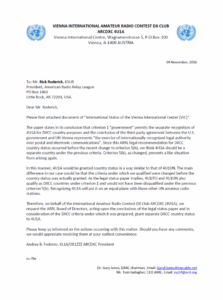
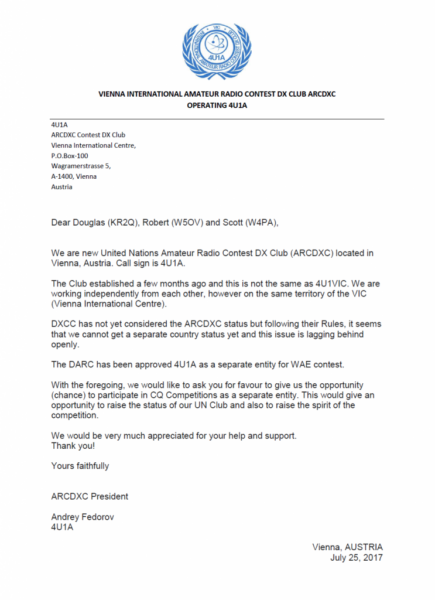

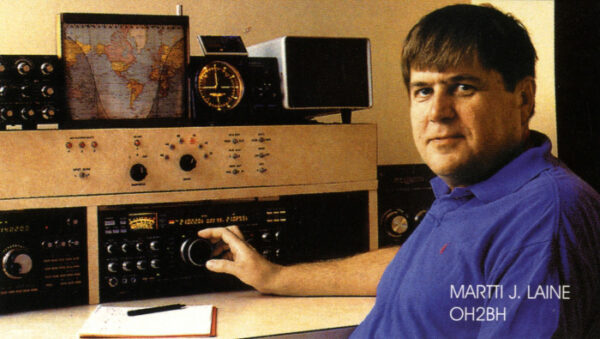
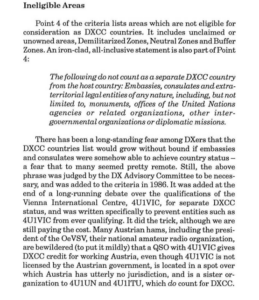
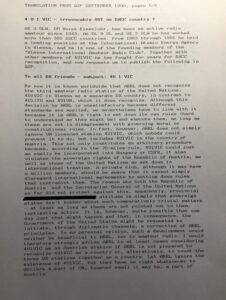





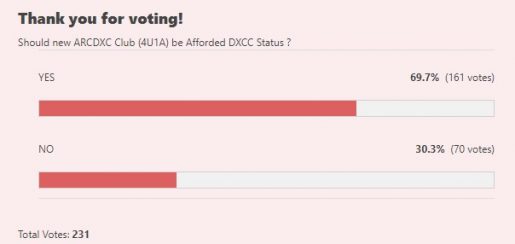


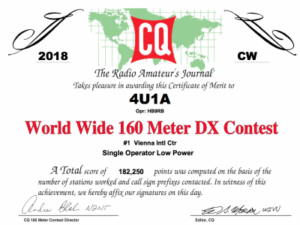
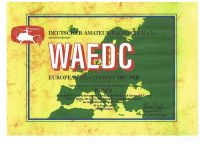 (Confirmation from DF8AA – Head of WAE):
(Confirmation from DF8AA – Head of WAE):
